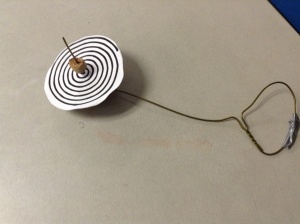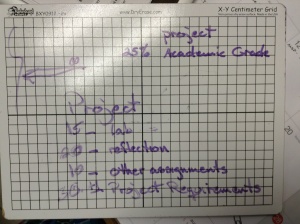I have sooo many goals for this new year; maybe too many. I need to start working on several of them the first week, no delaying or procrastination. Like dealing with all the paper that teaching seems to generate. But the most important goal that I have is to begin as I mean to go on.
I don’t want the first day to be all about rules and administrative tasks and (blech) paperwork. I certainly don’t want those things to be the major theme of the year. So I am going to start the very first day with a plan similar to how I want the rest of the year to go. I am going to ask my students to think about things related to the content they will be covering. I am going to ask them to do some investigation and analysis, then share their results. And I am going to ask them to reflect on what they did. And, yes, we will do that administrative stuff, like discussing rules and passing out the syllabus, but not until we do the important stuff.
In my life science class, the students will be describing what life is and building a word cloud for their first notebook document. (Periodically during the course, they will revisit that theme to see how their vision has changed.) They will find some other opinions on what life is and build word clouds based on those visions, then do a little comparative analysis. After sharing their results, I will ask them to do a little reflecting on the results. The whole shebang will become part of their portfolios as documentation of their starting point. Next comes some “Animal, Mineral, Vegetable” to start them thinking about similarities and differences. Since first day is freshman only (half of this class), they will have to be ready to share their results the next day with the other students. And then finally we can deal with the administrative details. At the end of the class, they will get their first exit ticket, a randomly drawn card that they have to identify as animal, vegetable, or mineral; whether it is alive or not; and how they know this. That is how I want each day to go forward. I know it will not always be like that; there may be lectures, labs, group activities, or some other thing. But I absolutely don’t want it to be a follow the textbook and do worksheets kind of class.
Basic Math will start a little more prosaically. With only two students, this will be more of a tutorial than a class; however, it is still important to begin as we mean to go on. As they enter, I will give them a card with instructions on where to find their binders and their seats, and what to start on right away. Once class begins, we will have an Act I activity. I like the pennies pyramid (thank you @mrmeyer); it is flexible enough to accommodate many levels of entry. Now that they are all warmed up, we can do the initial assessment. I have to have that information as soon as possible so I know what interventions they will need. From there, we will do some common reflection about the activity, the assessment, and how they feel about “doing” math. We’ll take care of the administrative stuff, then do the exit ticket. It will be a set of self-assessing questions on work habits.
In general, I want to start building the habit of greeting students at the door; this was something I struggled with last year, so I am really going to make an effort this year. I also like beginning with an entry problem or task. Last year, my Algebra class came in and started right away on the SAT Question of the Day that I had printed for them. I was so pleased the day I realized they were finishing it before the second bell was ringing for class to start. Yay, way to extend the class period! I definitely want to continue this. My biggest goal is to do the same at the end of class. I really need to establish an exit ticket habit. The only way to make sure it happens is to start with it right away, first week, and don’t let up. It takes an average of two months to really establish a new habit, so I can’t waste any time!
Read Full Post »

